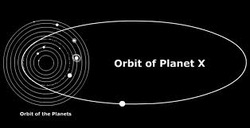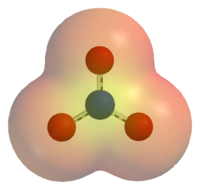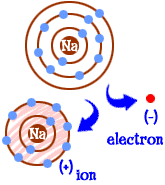
"The stars of heaven, let him [Nibiru] set their course; let him shepherd all the gods like sheep". - ^ ab Michael S. Heiser. "The Myth of a Sumerian 12th Planet". http://www.michaelsheiser.com/nibiru.pdf
Nibiru (very often misspelled Niburu) may refer to:
Nibiru (very often misspelled Niburu) may refer to:
- Nibiru (mythology): is generally accepted to be the planet Jupiter - but it is not.
- Nibiru is on the one hand the name of a Babylonian god, and on the other hand a name of a celestial object in Babylonian mythology, in conjunction with an astronomical constellation. The word is derived from a cuneiform term meaning, loosely, a crossing marker or crossing point. Nibiru, to the Babylonians, was the celestial body associated with the god Marduk. The name is Akkadian and means 'crossing place' or 'place of transition'.
- Nibiru, which is said to have occupied the passageways of heaven and earth, because everyone above and below asks Nibiru if they cannot find the passage. Nibiru is Marduk's star which the gods in heaven caused to be visible.
- is a supposed encounter between the Earth and a large planetary object (either a collision or a near miss) which certain subcultural groups believe will take place in the early 21st century. Believers in this doomsday event usually refer to this object either as Planet X or Nibiru.
Ion - EuripidesIon (Greek: Ίων / Iōn)is an ancient Greek play by Euripides, thought to be written between 414 and 412 BC. It follows the orphan Ion in the discovery of his origins.
StoryIon begins with Hermes explaining how he had saved the exposed child and delivered him to the temple of Apollo in Delphi. He grew up as an orphan, and was taken care of by the Pythian Priestess. The audience is aware that this child Ion is Creusa's son, although the characters are still in the dark. Creusa and her handmaidens arrive at the temple and meet Ion, and their respective backgrounds are relayed to each other. However, Creusa makes him believe the woman she is speaking of is not herself. Xuthus then arrives at the temple and is told a prophecy that the first man he meets when leaving the temple is his son. However, it was a false prophecy as the man he meets is Ion. Xuthus gives him this name Ion, "in accordance with what happened, for that thou wert the first to cross my path as I came forth from Apollo's sanctuary." (as translated by Edward P. Coleridge). After some discussion, the two both believe the prophecy and are happy. But they decide it would be in everyone's best interest if it were kept secret for a while. The handmaidens are unable to keep this secret, despite Xuthus's threatened penalty of death to whoever spills it. Creusa receives some bad advice from her old servant, and she decides to murder Ion. Using a drop of Gorgon's blood she inherited, she has the servant attempt to poison him. However, the attempt fails and she is found out. In order to escape death, she seeks protection in the temple. Ion goes after her seeking revenge for the murder plot. In the temple, they are given clues from the priestess as to Ion's true origin: the items he was found in. Creusa discovers Ion is her son, and with these clues she proves it to him as well. Despite her having attempted to kill her son twice, and him kill her once, they become overjoyed with the discovery and make up. Athena comes down at the end and puts any doubt to rest, and gives the reason for the earlier false prophecy of him being Xuthus son. It was to give Ion a noble position, rather than being considered a bastard. She foretells that Ion will one day rule, and his name will be given to the land in his honor. Read the play - Follow the link! http://www.sacred-texts.com/cla/eurip/ion.htm |
Ion - PlatoIn Plato's Ion (Greek: Ἴων) Socrates discusses with the title character the question of whether the rhapsode, a professional performer of poetry, gives his performance on account of his skill and knowledge or by virtue of divine possession.
Ion has just come from a festival of Asclepius at the city of Epidarus, and is full of himself for having carried off first prize in the competition. Socrates presses the view that it is divine possession and not acquired skill that is behind the rhapsode's art. Socrates subjects Ion to his philosophical dialectic, and gets him to admit that because he recites Homer's war stories, he is as much military general as rhapsode. Ion admits when Socrates asks, that his skill in performance recitation is limited to Homer, and that all other poets bore him. Socrates finds this puzzling, and sets out to solve the "riddle" of Ion's limited expertise. He points out to Ion that art critics and judges of sculpture normally do not limit themselves to judging the work of only a single artist. Socrates deduces from this observation that Ion has no real skill, but is like a soothsayer or prophet in being divinely possessed. Socrates offers the metaphor of a magnet to explain how the rhapsode transmits the poet's original inspiration from the muse to the audience. He says that the god speaks first to the poet, then gives the rhapsode his skill, and thus, gods communicate to the people. Socrates tells Ion that he must be out of his mind when he acts, because he can weep even though he has lost nothing, and recoil in fear when in front of an admiring audience. Ion says that the explanation for this is very simple: it is the promise of payment that inspires his deliberate disconnection from reality (535e). Ion tells Socrates that he cannot be convinced that he is possessed or mad when he performs, but Socrates does not allow him to explain why he rejects this explanation (536d,e). Socrates then recites passages from Homer regarding medicine, divining, fishing, and making war. He asks Ion if these skills are distinct from his art of recitation. Ion becomes confused and admits that while Homer discusses many different skills in his poetry, he never refers specifically to the rhapsode's craft, which is acting. Socrates peppers Ion with his questions, presses him about the exact nature of his skill. Doing his best to cope with Socrates' dialectic, Ion asserts that he cannot tell. Socrates complains that Ion changes his occupation. He gently berates the rhapsode for being Protean, which after all, is exactly what an rhapsode is: a man who is convincingly capable of being different people on stage. Read the play - follow the link! http://classics.mit.edu/Plato/ion.html |
Ion - Sciencei·on (ī'ŏn', ī'ən)
n. An atom or a group of atoms that has acquired a net electric charge by gaining or losing one or more electrons. ion [(eye-uhn, eye-on)] n. An atom that has either lost or gained one or more electrons, so that it has an electrical charge. Ions can be either positively or negatively charged. An electrostatic potential map of the nitrate ion (NO3-). Areas coloured red are lower in energy than areas colored yellow An ion is an atom or molecule where the total number of electrons is not equal to the total number of protons , giving it a net positive or negative electrical charge. An anion (pronounced /ˈænaɪən/; an-eye-on), from the Greek word ἀνά (ana), meaning 'up', is an ion with more electrons than protons, giving it a net negative charge (since electrons are negatively charged and protons are positively charged). Conversely, a cation (pronounced /ˈkætaɪən/; cat-eye-on), from the Greek word κατά (kata), meaning 'down', is an ion with more protons than electrons. An ion consisting of a single atom is a monatomic ion. If it consists of two or more atoms, it is a polyatomic ion. Polyatomic ions containing oxygen, such as carbonate and sulfate, are called oxyanions. When writing the chemical formula for an ion, its charge is written as a superscript '+' or '−' following a number indicating the difference between the number of protons and the number of electrons. The number is omitted if it is equal to 1. For example, the sodium cation is written as Na+, the '+' indicating that it has one less electron than it has protons. The sulfate anion is written as SO42−, the '2−' indicating that it has two more electrons than it has protons. If an ion contains unpaired electrons, it is called a radical ion. Just like neutral radicals, radical ions are very reactive. |
To conclude, we have educed the following to encompass the company's directive:
"Ion", is a play by both Euripides, and Plato - both of which are ancient greek texts; significant because as a company we draw from the roots of story telling (Euripides), and philosophy (Plato).
Significant passages from Plato's Ion:
"Nibiru", is the change that is sure to come. Nibiru is god-like in itself. We are a prophecy.
Nibiru is us, now. We are the very entity of 'change'. We will mark the passageway from the dark to light; a beacon at a crossing. We will guard this passage with all our might through unity and consideration of each other and the world arond us as a whole; a responsibility to represent those without the capacity, inclination or commitment to express the stories of our time.
Significant passages from Plato's Ion:
- "...that when a man has acquired a knowledge of a whole art, the enquiry into good and bad is one and the same."
- "The gift which you possess of speaking excellently about Homer is not an art, but, as I was just saying, an inspiration; there is a divinity moving you, like that contained in the stone which Euripides calls a magnet, but which is commonly known as the stone of Heraclea. This stone not only attracts iron rings, but also imparts to them a similar power of attracting other rings; and sometimes you may see a number of pieces of iron and rings suspended from one another so as to form quite a long chain: and all of them derive their power of suspension from the original stone. In like manner the Muse first of all inspires men herself; and from these inspired persons a chain of other persons is suspended, who take the inspiration…"
- "Do you know that the spectator is the last of the rings which, as I am saying, receive the power of the original magnet from one another? The rhapsode like yourself and the actor are intermediate links, and the poet himself is the first of them. Through all these the God sways the souls of men in any direction which he pleases, and makes one man hang down from another."
- SOCRATES: "But, indeed, Ion, if you are correct in saying that by art and knowledge you are able to praise Homer, you do not deal fairly with me, and after all your professions of knowing many glorious things about Homer, and promises that you would exhibit them, you are only a deceiver, and so far from exhibiting the art of which you are a master, will not, even after my repeated entreaties, explain to me the nature of it. You have literally as many forms as Proteus; and now you go all manner of ways, twisting and turning, and, like Proteus, become all manner of people at once, and at last slip away from me in the disguise of a general, in order that you may escape exhibiting your Homeric lore. And if you have art, then, as I was saying, in falsifying your promise that you would exhibit Homer, you are not dealing fairly with me. But if, as I believe, you have no art, but speak all these beautiful words about Homer unconsciously under his inspiring influence, then I acquit you of dishonesty, and shall only say that you are inspired. Which do you prefer to be thought, dishonest or inspired?"
- ION: There is a great difference, Socrates, between the two alternatives; and inspiration is by far the nobler.
- SOCRATES: Then, Ion, I shall assume the nobler alternative; and attribute to you in your praises of Homer inspiration, and not art.
"Nibiru", is the change that is sure to come. Nibiru is god-like in itself. We are a prophecy.
Nibiru is us, now. We are the very entity of 'change'. We will mark the passageway from the dark to light; a beacon at a crossing. We will guard this passage with all our might through unity and consideration of each other and the world arond us as a whole; a responsibility to represent those without the capacity, inclination or commitment to express the stories of our time.
- We are the next in the line of divine inspiration.
- As individual's we are ION's, and as a collective we are NIBIRU.
- Keep an "ION" (Eye on) "NIBIRU" [pun intended]









